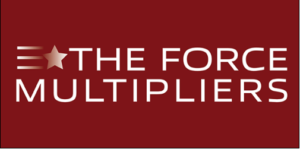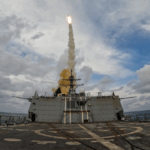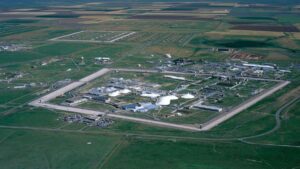
In this monthly column, Defense Daily highlights individuals from across the government, industry and academia whose efforts contribute daily to national defense, from the program managers to the human resource leaders, to the engineers and logistics officers.
Krista McKendree serves as the Vice President of DoD Business Development at ITC Federal, where she leads the expansion of the company’s defense-focused customers and drives efforts to deepen engagement with defense agencies. McKendree, a former U.S. Marine, has over 20 years in business development, DoD missions and capturing mission-aligned opportunities. Previously she served in leadership business development roles at cBEYONData and Northrop Grumman.
How did you get involved in the defense industry or community?
After I graduated, I sought out a position that would value my degree and military experience and allow me to support the military and maintain my connection with my USMC community.
I started as a marketing analyst at Northrop Grumman supporting business development, which led to various GovCon community roles supporting an array of defense missions. Throughout my career I’ve worked closely with the DOD, focusing on company growth, business development and customer relationship management.
What are some challenges you faced working through your career?
I quickly transitioned from marketing to business development, which was one of the biggest challenges of my career. I had to advocate for the shift and define a role that didn’t yet exist.
The learning curve was steep as I learned about government acquisitions and BD fundamentals on the job. That hands-on experience gave me lasting skills and a deep understanding of what it takes to succeed in this industry.
Did you feel like you always had sufficient mentors and leaders to help guide you? Why/why not?
I’ve always been driven to grow both professionally and personally and to learn from those around me. Mentorship doesn’t always come from someone with a formal title or decades of experience. Valuable lessons come from peers and younger professionals whose fresh perspectives, adaptability and curiosity challenge me to think differently.
A growth mindset is important in our industry where the only constant is change. I’ve learned from a wide range of people and pay that forward by supporting others on their journeys.
How do you work to be a mentor yourself to younger counterparts?
I strive to be open, available and honest with my team. When working with junior colleagues, I pay close attention to what they naturally gravitate toward, what they enjoy and where they excel, and I encourage them to lean into those strengths.
I prioritize real conversations to understand interests, goals and potential paths. One of the great things about business development is that it offers a variety of tracks—competitive intelligence, proposal management, pricing, capture—each requiring a unique skill set. I help mentees see where their talents align and how they can grow in that direction.
Mentorship is about creating space for others to discover their potential and actively supporting them as they build confidence and develop capabilities.
What are some of the under-appreciated positions in the defense field, the unsung heroes or essential cogs in the machine that help the job get done with less recognition?
In the defense industry the people behind the scenes are often the ones who make mission success possible.
Some of the most essential contributors are under-recognized. Business development support roles like BD analysts, competitive intelligence professionals, and proposal managers are crucial. They’re the engine behind every successful pursuit, ensuring informed strategies, compelling proposals, and team alignment and focus.
In today’s environment where AI tools are becoming integrated into the capture and proposal process, the value of these roles has increased. It’s not just about generating content, it’s about validating it, cross-checking for accuracy and provenance, and ensuring that what’s submitted reflects the customer’s needs and the company’s capabilities.
These professionals are the connective tissue that holds the effort together and the unsung heroes of every win
How has the culture changed around diversity within your career?
We’re seeing more inclusivity for women and people of color, particularly in key C-suite positions outside traditional lanes of HR or communications. That visibility matters—it signals progress and opens doors for others.
As the defense industrial base continues to grow and diversify, we’ll see that reflected in both the culture and the community.
There’s still a long way to go. Barriers to entry remain, especially for those without existing networks or insider knowledge. This is a complex industry governed by layers of regulation, acquisition policy and procedural nuance. Understanding how the government buys, how the budget cycle works and how to navigate the many procurement pathways is no small feat.
The defense community is a relatively closed ecosystem, often shaped by those with military or federal experience. This makes it difficult for new voices to break in. Through intentional mentorship, outreach and structural change, I’m hopeful we’ll continue to see a more inclusive and representative defense community emerge.
What is your advice for new entrants to the defense/military community?
Keep the mission at the center: Understanding the mission you support is foundational. Technology, policy, acquisition and operations all tie back to national security and warfighter readiness.
Respect the culture: The defense community is rooted in service, discipline and hierarchy. Understanding military customs, ranks, and protocols and using correct titles go a long way in building trust and credibility.
Be patient and persistent: Processes can be slow and complex. Whether you’re navigating acquisition cycles, compliance requirements, or stakeholder engagement, persistence and professionalism are key. Learn the timelines, but don’t be discouraged.
Build relationships, not just contacts: Relationships are built on trust and shared purpose. Show up consistently, listen more than you speak, and follow through on your commitments. People remember integrity.
Stay informed and adaptable: The defense landscape evolves rapidly as there are new threats, emerging technologies, and constantly shifting budgets. Stay current on policy changes, global events and innovation trends. Be ready to pivot and contribute where the need is greatest.
Understand the acquisition ecosystem: Familiarize yourself with FAR, DFARS, SBIR/STTR programs, and the roles of key players like DARPA, DIU, and the services’ acquisition commands. Knowing how the system works helps you navigate it more effectively.
Serve with purpose: Whether you’re in uniform, a civilian, or an industry partner, remember that your work supports those who serve. That sense of purpose is what makes this community so meaningful and impactful.
What do you see as the future of your sector in national defense?
The regulatory frameworks that govern the acquisition of weapon systems are not ideally suited for establishing data centers or deploying cloud-based applications. As a result, we’ve seen a critical shift in how the DOD procures software and IT solutions, characterized by faster acquisition cycles, quicker deployment and more agile implementation strategies.
As acquisition policies evolve to support faster and more flexible procurement processes, competition will increase, fostering innovation, reducing costs and introducing new players into the field. This also presents new challenges, including more proposal reviews and a greater burden on acquisition professionals to maintain fairness and compliance.
Mid-tier companies play a role here as they enhance the value provided to the government but occupy a unique and agile niche that is currently difficult to formally distinguish in acquisition processes. This includes our work at ITC Federal—we bring deep technical expertise and closely align with customers’ missions, while we combine the agility and flexibility of smaller businesses with the capacity to support large-scale contracts.
The future of our sector will be defined by how effectively we balance speed with diligence. We will require smarter acquisition strategies, enhanced utilization of AI and automation in evaluation processes, and a sustained focus on transparency and accountability. If executed well, this approach will enable us to modernize more swiftly, sustainably and securely.
Who are the Force Multipliers in your community? Let us know at forcemultipliers@defensedaily.com.














